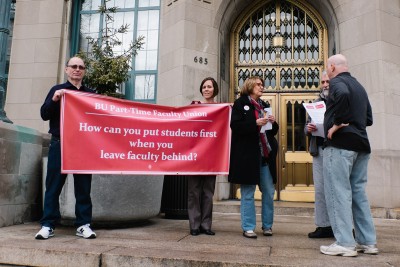
The Boston University adjunct faculty members and the administration agreed on a three-year tentative contract settlement early Thursday morning, 14 months after adjunct faculty unionized with the Service Employees International Union Local 509, a Thursday release stated.
If the affected adjunct professors ratify the contract, approximately 800 adjunct professors at the university will have higher per-course pay, more course stability, funds for professional development and a voice in the university’s decision-making process, the release noted.
“Both sides worked hard to come to a fair agreement that respects the value and dignity of our part-time faculty, while preserving important management rights for BU,” BU Director of Labor Relations Juditra Burgess wrote in an email.
Marie McDonough, an English professor and a member on the faculty bargaining team, said the faculty and university bargaining teams met Wednesday afternoon and reached an agreement after a 14-hour bargaining session.
“One of the things we kept in mind while negotiating was the well-being of our students,” said McDonough, a professor in the College of Arts and Sciences. “What we wanted and accomplished were a set of working conditions that gives students a kind of sense of stability and predictability — whether their professors will continue teaching in the following semesters, and whether they will be available over email for letters of recommendation.”
McDonough said BU adjuncts’ movement toward unionization reflects a spreading trend throughout Boston.
“We see part-time and full-time faculty at other universities who are [also] getting together and saying that previously invisible constituencies at their universities shouldn’t be ignored any longer,” McDonough said. “It’s wonderful to be a part of a movement to recognize the value of our labor, and specifically our teaching.”
Dan Hunter, an English professor who has been involved with the adjuncts’ movement since its beginning, said he attributes persistency and public support to the adjuncts’ success in reaching an agreement with the university.
“We were consistent and fought hard for this,” Hunter said. “The students’ support is incredible, and we appreciate their support very much. The process was becoming more and more public, particularly the concern about how long it had been taking [to reach a contract].”
Students’ support came in different forms. Clean Slate, one of three slates that ran in the BU Student Government Executive Board election, included the support of increased benefits for adjunct professors in their platform, The Daily Free Press reported March 27.
The BU Student Curriculum Committee joined adjunct professors in several protests on campus, including a march from Marsh Plaza to BU President Robert Brown’s office on April 14, when the protesters blocked Commonwealth Avenue for approximately 10 minutes, The Daily Free Press reported April 15.
Several students said they were happy to learn about the tentative agreement between adjunct professors and the university, because having happier faculty on campus will lead to better educational experiences for students.
Daniel Reichling, a junior in CAS, said he believes every professor should have the same basic rights, and some professors should be treated better if the students have positive feedback.
“Whether faculty unionization is a good thing depends on how much you are willing to pay for professors,” Reichling said. “Ultimately, professors should be rewarded based on their performance, but it is very difficult for the university to measure that. Some students just do not learn well.”
Jodi-Ann Manning, also a junior in CAS, said though she believes every professor should have the right to unionize, some of the adjuncts’ demands do not appeal to her as a student.
“It makes sense that full-time professors at the university would have their own office, and it will probably be hard for the university to give an independent office for every adjunct professor,” Manning said.
Cecily Donovan, a freshman in CAS, said the university made a good decision to reach an agreement with adjunct professors, especially in light of recent adjunct professor protests.
“When teachers are paid by the amount which they think reflects how much they put into the job, both students and the university will benefit,” Donovan said. “BU is a business, but by the end of the day, its priority is to educate. We don’t want adjunct professors to go on strikes, because that will compromise student’s education.”




